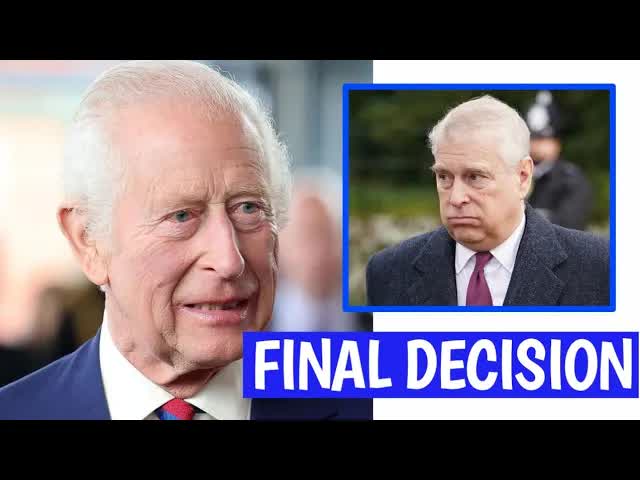In a shocking twist of fate, Prince Andrew, the Duke of York, is set to be evicted from the Royal Lodge, and the man behind this dramatic decision is none other than his brother, King Charles III.
What has led to this unexpected turn of events?
And how will it impact Andrew’s already tarnished royal legacy?
Let’s dive into this unfolding saga, exploring the complex family dynamics at play and what this could mean for the future of the British monarchy.
Prince Andrew’s journey from royal darling to controversial figure has been anything but smooth.
Once basking in the glow of privilege as the second son of Queen Elizabeth II, he was celebrated as a war hero following his service in the Falklands War and was affectionately nicknamed “Randy Andy” for his charm and good looks.
His marriage to Sarah Ferguson in 1986 seemed to solidify his fairytale existence, yet the cracks began to show as early as the 1990s.
The couple announced their separation in 1992, leading to a divorce four years later.
This marked the beginning of Andrew’s public decline.
After initially enjoying royal favor, he slowly faded from the limelight, making only sporadic appearances at official events.
The situation worsened with the emergence of the Epstein scandal in the 2010s, which brought to light his questionable associations with the late financier Jeffrey Epstein.
A disastrous BBC interview in November 2019 proved to be a turning point for Andrew.
Instead of clearing his name, his statements—such as claiming he couldn’t sweat and showing little empathy for Epstein’s victims—only deepened public scorn.
Following this debacle, both public and institutional support for him dwindled, leading to what many perceived as a gentle exile from royal duties.
The passing of Queen Elizabeth II in September 2022 ushered in a new era for the monarchy, with King Charles III aiming to streamline the royal family.
This shift hit Andrew particularly hard, as he had relied heavily on royal backing.
His residence at the Royal Lodge became a symbol of his royal status, making the rumors of eviction by King Charles all the more significant.
Reports suggest that King Charles’s decision to evict Andrew stems from a desire to modernize the monarchy and distance the royal family from Andrew’s controversial reputation.
However, the exact motivations remain unclear.
Some speculate that there are deeper familial rifts at play, with Andrew feeling betrayed by his brother’s actions.
As the eviction looms closer, the media has responded with varying perspectives.
While The Daily Mail hints at a power struggle within the family, The Guardian views the eviction as a necessary step to restore the monarchy’s credibility.
Meanwhile, The Times highlights Andrew’s feelings of betrayal, shedding light on the intricate dynamics that have long characterized the royal family.
Andrew now faces a challenging future.
Losing his residence and royal income places him in a precarious financial position.
Without the royal benefits that have supported his lifestyle, he may struggle to maintain his previous standard of living.
Reports indicate he is tapping into private funds, including those inherited from his late mother, Queen Elizabeth II.
Support from his ex-wife, Sarah Ferguson, has been unwavering, as she describes the situation as heartbreaking.
Public sentiment, however, is mixed.
While some express sympathy for Andrew, many feel he deserves the repercussions of his past actions.
In a time when the British public is increasingly disenchanted with the monarchy, Andrew’s plight has become fodder for humor and memes on social media.
King Charles’s choice to evict Andrew is not merely a personal matter; it carries implications for the monarchy’s future.
Balancing royal duty with family loyalty is a delicate act, and Charles’s decision reflects a commitment to the institution’s integrity.
As he navigates his brother’s troubled legacy, the ongoing debate about how to restore the monarchy’s reputation looms large.
Prince Andrew’s eviction signifies more than just losing a home; it represents a significant decline influenced by personal missteps and evolving family dynamics.
King Charles’s actions underscore a shift in the royal family’s approach, where past behaviors are no longer overlooked.
Andrew’s quest for redemption remains uncertain as he grapples with his life outside royal confines.
Despite the support from his daughters, Princesses Beatrice and Eugenie, they too must navigate their royal responsibilities amid the ongoing scandal.
The scrutiny on the royal family intensifies, with King Charles needing to tread carefully to preserve the monarchy while modernizing its image.
Public opinion, especially among younger generations, adds another layer of complexity to the royal family’s challenges.
Reflecting on Prince Andrew’s saga, it’s clear that privilege does not shield one from consequences.
His story serves as a cautionary tale about accountability in a rapidly changing society.
The eviction marks not only a personal loss for Andrew but also signifies a broader transformation in the monarchy’s relationship with contemporary values.
As the British royal family continues to confront the challenges of power and privilege, all eyes will be on how they adapt to this transitional phase.
Whether Prince Andrew can carve out a new path for himself or if his royal narrative has reached its end remains to be seen.
The repercussions of his downfall will undoubtedly echo through the monarchy for years to come.










